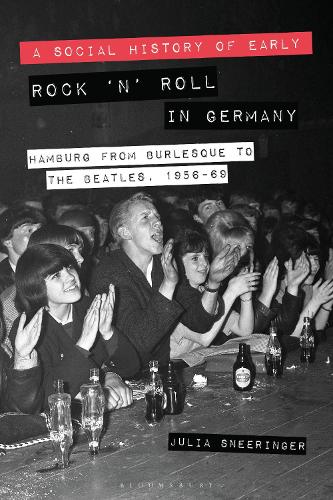
A Social History of Early Rock n Roll in Germany: Hamburg from Burlesque to The Beatles, 1956-69
(Paperback)
Available Formats
Publishing Details
A Social History of Early Rock n Roll in Germany: Hamburg from Burlesque to The Beatles, 1956-69
By (Author) Associate Professor Julia Sneeringer
Bloomsbury Publishing PLC
Bloomsbury Academic
28th November 2019
United Kingdom
Classifications
Tertiary Education
Non Fiction
Social and cultural history
Popular music
781.660943515
Physical Properties
Paperback
304
Width 156mm, Height 234mm
426g
Description
A Social History of Early Rock n Roll in Germany explores the people and spaces of St. Paulis rocknroll scene in the 1960s. Starting in 1960, young British rockers were hired to entertain tourists in Hamburgs red-light district around the Reeperbahn in the area of St. Pauli. German youths quickly joined in to experience the forbidden thrill of rocknroll, and used African American sounds to distance themselves from the old Nazi generation. In 1962 the Star Club opened and drew international attention for hosting some of the Beatles' most influential performances. In this book, Julia Sneeringer weaves together this story of youth culture with histories of sex and gender, popular culture, media, and subculture. By exploring the history of one locale in depth, Sneeringer offers a welcome contribution to the scholarly literature on space, place, sound and the city, and pays overdue attention to the impact that Hamburg had upon music and style. She is also careful to place performers such as The Beatles back into the social, spatial, and musical contexts that shaped them and their generation. This book reveals that transnational encounters between musicians, fans, entrepreneurs and businessmen in St. Pauli produced a musical style that provided emotional and physical liberation and challenged powerful forces of conservatism and conformity with effects that transformed the world for decades to come.
Reviews
The book is at its best when presenting the local scene in its richness, describing players and contestants and their environs, motivations, and aspirations. * American Historical Review *
This book brings together several different types of first-hand materials to highlight the significance of St. Pauli as a space for musicians, audiences, and many more to converge and question what life could be in post-war Germany. Sneeringer makes music the central focus of the book and uses that focus to explore the people, the place, and the district of St. Pauli, which continue to have a significant role in Hamburg today. * Focus on German Studies *
Sneeringer adds to the ever-expanding scholarship around popular culture, rock n roll, youth, and urban spaces. Her case study, as well as her efforts to explore discussions tied to music, delinquency, gender, and sexuality offers those intrigued by the work of scholars like Leif Jerram an important look into daily life throughout this period. The authors use of sources beyond government documents and traditional newspapers diversifies the story line and adds alternative perspectives. * Journal of Modern History *
We've known for a very long time that Hamburg -- and St. Pauli in particular -- was a crucible of rock 'n' roll vitality during the 1960s, both as an engine of West German youth culture and as a conduit for transnational influences from Liverpool, the United States, and elsewhere. But only now, with Julia Sneeringer's brilliantly executed social history, do we have full chapter and verse. * Geoff Eley, Distinguished Professor of Contemporary History, University of Michigan, USA *
This riveting social history is also a sonic biography of Hamburg's St. Pauli district, nerve center of early rock & roll in West Germany. Sneeringers lively prose brings the rollicking scene to life: its labor, fandom, commerce, community, sex, and especially its music. Made me feel like I was there (and made me wish I had been). * Joy H. Calico, Professor of Musicology, Vanderbilt University, USA *
Sneeringer has produced an intellectually engaging and very readable book that examines the everyday realities, experiences, dreams, and mythologies of a city that held its own particular histories, mysteries, secrets, and soundscapes in the personal narratives of post-war popular music. * Cultural and Social History *
Author Bio
Julia Sneeringer is Associate Professor of History at Queens College and the Graduate Center, City University of New York, USA. She is the author of Winning Women's Votes: Propaganda and Politics in Weimar Germany (2002).
